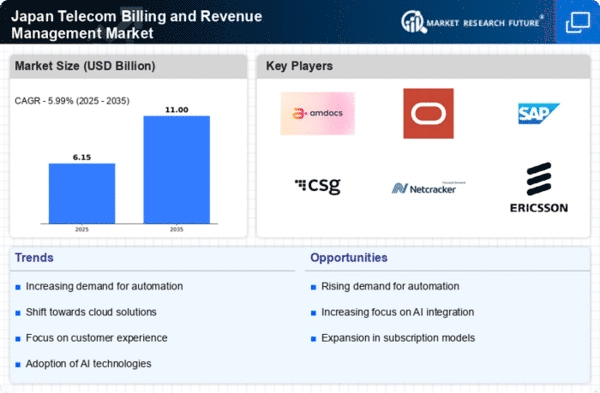Growth of Digital Services and E-commerce
The expansion of digital services and e-commerce in Japan is a pivotal driver for the Telecom Billing and Revenue Management Market. As more consumers engage in online transactions and digital content consumption, telecom operators are required to implement billing systems that can efficiently handle these new service models. The rise of over-the-top (OTT) services and mobile payment solutions has further complicated billing processes, necessitating advanced revenue management capabilities. By 2025, it is projected that digital services will contribute to a 25% increase in billing transactions, underscoring the need for telecom companies to adapt their billing systems accordingly. This growth in digital services not only enhances revenue potential but also drives innovation within the telecom billing-revenue-management market.
Competitive Pressure and Market Consolidation
The Telecom Billing and Revenue Management Market in Japan is characterized by intense competitive pressure and ongoing market consolidation. As telecom operators strive to maintain market share, they are compelled to enhance their billing capabilities to offer superior customer experiences. This competitive landscape drives innovation, prompting companies to invest in cutting-edge billing technologies that can streamline operations and reduce costs. Additionally, mergers and acquisitions among telecom firms are leading to the consolidation of billing systems, creating opportunities for economies of scale. By 2025, it is expected that competitive dynamics will result in a more concentrated market, with a few key players dominating the telecom billing-revenue-management market. This consolidation is likely to drive further advancements in billing solutions, as companies seek to leverage shared resources and expertise.
Technological Advancements in Billing Systems
The Telecom Billing and Revenue Management Market in Japan is experiencing a surge due to rapid technological advancements. Innovations such as cloud computing and big data analytics are transforming traditional billing systems into more efficient, scalable solutions. These technologies enable telecom operators to manage vast amounts of data, leading to improved accuracy in billing and revenue collection. As of 2025, the market is projected to grow at a CAGR of approximately 8.5%, driven by the need for enhanced operational efficiency. Furthermore, the integration of advanced analytics allows for better customer insights, which can lead to tailored service offerings. This evolution in technology not only streamlines processes but also enhances customer satisfaction, making it a crucial driver in the telecom billing-revenue-management market.
Regulatory Changes and Compliance Requirements
The Telecom Billing and Revenue Management Market in Japan is significantly influenced by regulatory changes and compliance requirements. The Japanese government has implemented stringent regulations aimed at enhancing transparency and protecting consumer rights. These regulations necessitate that telecom operators adopt robust billing systems that ensure compliance with legal standards. As a result, companies are increasingly investing in advanced billing solutions that can adapt to changing regulatory landscapes. The need for compliance not only mitigates risks associated with penalties but also fosters consumer trust. By 2025, it is anticipated that compliance-related investments will constitute a substantial portion of the overall spending in the telecom billing-revenue-management market, highlighting the importance of regulatory adherence as a market driver.
Increasing Demand for Customized Billing Solutions
In Japan, the Telecom Billing and Revenue Management Market is witnessing a growing demand for customized billing solutions. As consumer preferences evolve, telecom operators are compelled to offer flexible billing options that cater to diverse customer needs. This trend is particularly evident in the rise of subscription-based models and pay-per-use services, which require sophisticated billing systems capable of handling complex pricing structures. The market is expected to expand as operators seek to differentiate themselves through personalized offerings. By 2025, it is estimated that customized billing solutions could account for over 30% of the total market share, reflecting a significant shift towards customer-centric approaches. This demand for tailored solutions is a key driver, pushing telecom companies to invest in advanced billing technologies.

















